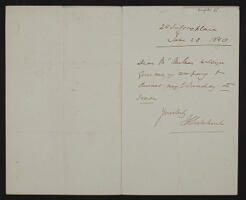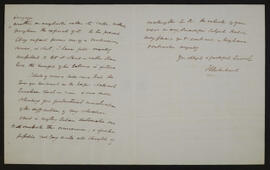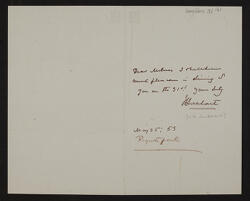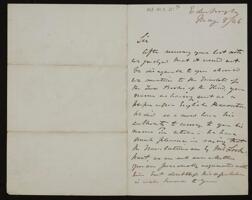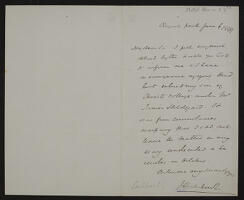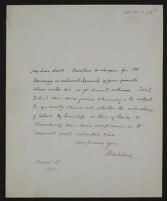Trinity College - RJ has not sent WW any of his '[cravets?] and speculations' on induction. WW has been 'working out the part about foreign trade which makes very nice equations and I think I see a little more light'. He will be 'hugely wroth' if Lockhart [John G. Lockhart] does not put his review of RJ in the same edition of the Quarterly Journal as his one on Herschel ['Modern Science: Inductive Philosophy', Quarterly Review 45, 1831].
WW sends his review article of RJ's book on rent ['Review of An Essay on the Distribution of Wealth and Sources of Taxation by the Revd Richard Jones', The British Critic, Quarterly Theological Review and Ecclesiastical Record, 10, 1831]: 'I do not like it as I told you but I hope you will not think much tinkering needful for it will be very troublesome and I do not feel half myself while that thief Lockhart has got my other altruism in his power'.
Buck’s Head Hotel, Glasgow.—(3rd.) Has attended the prize-giving ceremony at the university. Describes the university buildings and discusses the characters of the professors.—1 Bath Street, (Glasgow).—(5th.) Describes the cathedral. Hooker has left some drawings of plants behind. Hopkirk’s encounter with striking workers in the Gorbals. (6th.) Her forthcoming engagements.
——————————
Transcript
Glasgow. Buck’s Head Hotel. May 3d 1820.
My dear Papa
Since I have now a little leisure time while Maria is preparing our lodgings for our reception I have begun a letter to you, though most likely it will not be sent for some days, but I am glad to take every opportunity of writing home, which is, I am sure, the most agreeable employment I can have here—even more agreeable than writing out my journal. Maria and I went on Monday with Mrs Thomson to see the distribution of the prizes—a ceremony which takes place annually on the 1st of May, previously to the students leaving the College for the vacation, which might be called the long vacation with more justice than ours is, as it lasts 6 months. The distribution takes place in the common hall of the University, in which all kinds of university business is performed on week days, and Divine service on Sundays. I told Mamma in my last letter how thinly it was attended and how irreverently on that day,—but on Monday it was entirely filled by the Students and Professors, and the galleries were crowded with spectators. Two silver medals were given to young men in the Divinity Class, and a great many handsome books were distributed in that and the other classes by the different Professors. A great deal of emulation and anxiety was excited among the Candidates, and a great deal of interest was shown by their friends and relations. Nothing can be less like an English Collegian than a Scotch one—instead of a smart young man, he is usually a shabby, dirty boy, perhaps not more than ten years old—and nothing can be more different than an English University and a Scotch one (if all Scotch ones are like Glasgow) for instead of a handsome set of buildings filled by the Collegians, this College consists of two gloomy Quadrangles inhabited by a limited number of the Professors, while the Students lodge where they may in the town, those who can afford it generally boarding with Clergymen, or with one or other of the Professors. Beyond the second Quadrangle is the Hunterian Museum, a very handsome, modern Grecian building, which looks very well by itself, but rather incongruous when seen in conjunction with the remainder of the College. Several of the Professors and their wives have called on Mr Hooker and Maria,—Professor Young is the one who seems most sensible, most acute, and most gentlemanly. He is a fine, intelligent old man, and his wife and daughter {1} would be thought quite ladylike, even in England. Mr Young is much acquainted with Mr Jeffery† who came here last week and pleaded on Saturday. I had the gratification of seeing him on Monday—he is a little man with an extremely acute and intelligent, though not at first sight a very pleasing countenance,—but he can look very pleasing when he converses. Dr Wardlaw, a very celebrated preacher among the Covenanters or Independents and Dr Muir were also at the College on the 1st of May: but to see Dr Chalmers we must go to his Church for he rarely goes into public on any other occasion—those who do not like him, and I am sorry to say there are several of that class among the Professors, attribute his retirement to a wish to appear more virtuous than his neighbors, to pride, to eccentricity etc, while others think the great charge he takes of his flock, and the numerous works he composes are a sufficient reason for his declining to appear much in company. I was glad to find Dr Young of this opinion—he looks on Dr Chalmers with sincere respect, and listens to him without finding him, as Dr Thomson told me he did, both wearisome and unintelligible. Now as Dr Thomson would be extremely amazed at its being thought that he did not understand to the full as much as any man in the united kingdoms of Great Britain and Ireland, and as thousands and thousands hear, understand, and almost adore, Dr Chalmers, I must conclude that Dr Thomson, and such as he, have set themselves against conviction—and if a man does this, you know that it is enough, and that he would not be persuaded, even though one rose from the dead. {2} Short as the time has been since I have been here, I have found there are schisms among this learned body of Professors. The principal one arises from the division of a certain sum from the funds of the College between a limited number of Professors instead of between the whole. This money amounts to as much as 4 or £500 annually to each of them, and they contend that since it was originally devoted to the profit of a certain number of Professors, they ought not to be obliged to divide their property with those who have been newly added to their body, but that, if the new comers are also to be endowed, new funds should be raised for this purpose. Dr Thomson is the most forward and the most unpopular among these “parvenus”, and I think he would like to draw Mr Hooker into a cooperation with him; but happily my brother has too much wish to be on good terms with his brethren to join in any scheme that might hazard their good will. At present he is extremely liked, apparently, by all, they have voluntarily made him an L.L.D. and seem to wish to give him every encouragement in their power. Dr Brown, whom you perhaps remember when you were here, has just called on him. He was Botanical Lecturer there, though the Professorship was not instituted, and has offered my brother any assistance in the way of advice which, as an experienced Lecturer, he may well be able to give. I hope Mr Hooker will be able to make his instructions amusing—he is at this time rather anxious about them. 1. Bath Street. May 5th. We are now settled in our new lodgings, and I think we shall find them very comfortable. Bath Street is quite at the western extremity of Glasgow, not very far from the Trongate, the great centre of the town, and about a mile and a quarter from the Botanic Garden. I have been to the Cathedral since I began this letter. It is situated on a little eminence on the North East of the city, which is now running away from it to the West, so that poor St Mungo is only surrounded by narrow crooked lanes, and house, some of which by their height shew that they have seen better days, but are now occupied by the lowest and filthiest in this unequal town. The front, I mean the West end, of the Cathedral is extremely mutilated—only one of the towers remain[s], and that is square and heavy and unornamented, and the central tower is also ugly enough, though it is surmounted by a spire. The south side is by far the handsomest and the least altered, though that is disfigured by a modern tomb (I think) running out where the south transept should have come, for both the transepts are but just indicated, and never were carried out, so as to form the figure of the Cross. All the windows of the Clerestory are of the earliest and simplest Gothic—those in the aisle below are much more complicated and adorned. Nothing can be more disfigured than the interior of this venerable Church. The west end is filled up with the most rigid, presbyterian aversion to whatever is grand or beautiful, and they have entirely succeeded in disfiguring it so that not a trace is left of its former magnificence. The east end has been better treated—the galleries and pews are of dark wood handsomely carved, an elegant pulpit supplies as well as it can the place that ought to be occupied by the altar, and the painted glass is allowed to remain in the windows. The capitals of the clustered columns here are more richly loaded with leaves and flowers, and the carving is more sharp and beautiful than any I ever saw. Peter, in his letters, {3} gives an admirable description of the appearance of this desolated Cathedral with its mouldering walls, and its churchyard paved with tomb stones—a grave had been recently dug among these, and the ground about was strewed with human bones. He describes admirably too the modern, Grecian Infirmary filling the place of the Episcopal palace on the one side, and, on the other, the little modern Gothic church which has an infinitely worse effect than St Margaret’s by Westminster Abbey.—Mr Hooker has, in unpacking and arranging his books here, discovered an omission, which distresses him very much. He has left behind him a leather case which contains 80 or 90 magnified drawings of different parts of plants by which he meant to illustrate his lectures. On discovering this misfortune yesterday he immediately wrote to my aunt Jas. Turner {4} at Halesworth with directions where to seek for the drawings, and to send them to him, but, since he had, in order to add to them, left them out, to the last, to take them in the sac†, he fears that he may have brought them on a few stages, and left them on the road. In the introductory lectures these drawings will not be wanted, but if my aunt cannot find them in time f<or> the succeeding ones, I do not know what my brother will <do>. He has, as yet, seen Mr Hopkirk, but once, and that was at his Counting house, or office, where he was taking depositions. Mr Hopkirk is a Magistrate, and one of the most respected and most active here. He had, the night before my brother called on him, been employed in taking arms from some disaffected people in the Gorbals, and the mob had resisted those who attempted to disarm them. There was a serious scuffle, but no lives were lost. Every one says that there has been and still is a great deal of distress among the poor here, in spite of the liberal subscriptions which have been raised for them, but it was not the poor and distressed, but men who at that time received from a guinea and [a] half to two guineas a week, who refused to work and made the most disturbance. More than 100 men in one manufactory on the officers of justice entering it to find out the seditions among them, openly told the officers tha if they sought for radicals, as they called them, they might, if they could, seize them all, as they were all of that description. Their present tranquillity is attributed more to the presence of the military and the strictness with which they are watched than to a disposition to do well among the leaders of the sedition; but many of those who from ignorance and a hope to improve their conditions would have joined the radicals at first, are now, it is thought, really disgusted with their proceedings, and disposed to be quiet. May 6th. I have delayed finishing my letter, dear Papa, in the hope of receiving one from home, which I now fear I shall not do for some days if you waited to receive my direction. You must remember that, though it will be three weeks tomorrow since I left Yarmouth, I have had but two letters from any one yet; and though I may have more to relate that is new than those at home can have, yet certainly I who am separated from you all, must be the one who wants the comfort of letters from home the most. Give my kind love to dear Mary, and tell her that if visiting here was very amusing I am likely to have amusement enough next week. We go this evening (Saturday) to Mr and Mrs Towers; on Tuesday to Mr and Mrs Mylne—Wednesday to Mr and Mrs Walker—Thursday to Mr and Mrs Young; and Friday to Dr and Mrs Muirhead. But, alas! we shall only meet the same set of Professors at the house of each, and, except the Youngs, I fear that, though they may understand Surgery, Anatomy, Moral Philosophy, etc etc, very well, they are not very entertaining companions. I hope you will not think from my saying this, or from Mr Hooker’s remarking that we thought these learned men a queer set, that either Maria or I behave as if we thought so. I am sure that, at present, they all like her very much, and really she has never given them the least cause to do otherwise; and I think that I have not either. Besides I am sure that they are a very hospitable people and we are entirely obliged to them for the desire they shew for our company, for certainly they must take us on trust. I hope you have written to Mr Lyell, and set him right in the mistaken notions respecting me; and pray remember that any news relating to any of your correspondants†, and particularly any of the Norman Letters will be highly amusing to me. Be kind enough to commend me very respectfully to Mr Layton when you write to him, and to remember me kindly to Mr and Mrs Brightwen. Give my best love and duty to Mamma and love to my dear sisters and brothers (in spite of Mr Cohen’s opinion against such messages) and believe me ever
your very dutiful and affectionate daughter
Eliz. Turner
[Superscription:] Dawson Turner Esqre | Great Yarmouth [In the bottom left corner:] Single Sheet—
[Postmarks:] [1] GLASGOW | A6 | MAY | 1820 | 405-<.> [2] [Indistinct.]
[Postal fee:] 1/2
——————————
{1} See Peter’s Letters to his Kinsfolk (1819), by ‘Peter Morris’ (John Gibson Lockhart), Letter LXVII.
{2} Charlotte Turner, later Vavasour.
{3} Probable reading, but possibly ‘seditions’ or ‘seditious’.
{4} Elizabeth therefore left home on 13 April.
2 Raymond Buildings, Gray's Inn - CL was annoyed that WW had good reason not to put forth 'your strength for the Q. R.' A similar experience happened to CL: 'I felt as you do that one cannot write if uncertain that your work will see the light'. CL knows that Lockhart [John Gibson Lockhart] liked his review of CL's first volume ['Principles of Geology']: 'it was pronounced your best product in point of style'. He sends WW a few sheets from volume two of his 'Principles of Geology'. CL would like WW not to 'say anything about our failures at King's College'.
Lancaster - WW hopes to be in Hertford by the 12th or 13th. How is RJ's work on wages progressing?: 'I hope you still keep your intention of being ready for another explosion in the course of the winter'. WW wants to know 'whether that Scotchman' [John Lockhart] will publish his review of RJ in the Quarterly Review.
WW has been writing his reply to Peter [possibly William Peter or Karl L. Peter. See WW to RJ, 9 October 1831], and is inclined 'to make a separate pamphlet of it by which means it can be more easily disseminated among those whom one would wish to see it'. WW does 'not much like the thought of having anything to do with Blackwood' [Blackwood Magazine]. However, because his piece on John Herschel in the Quarterly Review 'is so little likely to attract or interest readers that I have little doubt Lockhart [John Lockhart] thinks himself well rid of me'. WW should do what Macaulay [Thomas B. Macaulay] 'does in reviews, who always takes care to put in as much thought as he can express clearly and illustrate well and not a bit more'.
London - CL has forwarded WW's corrections [Review of 'Lyell's 'Principles of Geology', volume 2', Quarterly Review, 1832] to the printer. Lockhart [John Gibson Lockhart - editor of the Quarterly Review] has read WW's review article and tells CL: 'there are some passages in which the style is 'contorted' - I would willingly give him two sheets if he would indulge in enlarging, not on your book for there is just about enough of that already but on the source of the more popular subjects treated of in your volume'.
Trinity College - It looks like Lockhart [John Lockhart] at last intends to put WW's review of RJ in the Quarterly Review. The article will hopefully do more good than if WW had written it against Peter [possibly William Peter or Karl L. Peter]: 'Still I should have liked much to have a knock at him for his reasoning in the Edinburgh...We must judge as well as we can whether after this article appears it is needful to answer Peter's puzzles'. WW is inclined to do so since they are the puzzles of an array of people: 'The two main points seem to be the proof that Ricardo, the Ricardians etc not merely mean Ricardian rents, which I suppose can be made out palpably enough: and the proof that McCulloch [J. R. McCulloch] himself has never had any but the most imperfect and incoherent glimpses of the effect of agricultural improvements; and that you have labour up that part in a way which shews the importance and having of it'. WW only talks of such projects for speculations sake. 'I do not know whether you are exactly aware how the young Ricardians will meet your proofs that the increase of rent is owing to improvement'. WW explains how he thinks they will counter RJ's claims.
Trinity College - When WW last wrote he had not seen the article on RJ in the Quarterly Review: 'I think you have great good luck in escaping out of my hands for I had not ventured to say so broadly what I supposed your plan to be though I expected to leave nearly the same impression, and I certainly never dreamt of quoting you to the extent to which Lockhart's [John Lockhart] established reviewer has done...I am quite sure both from what he says to me and still more from the inscrutable manner in which the whole business of the Review is carried on that he is very far from absolute, and that there is some greater power behind his editorial throne'. WW thinks that RJ's success among the existing political economists, will depend greatly 'on its being explained to them what you are supposed to have different from their doctrine'. If RJ wants 'candid and thinking readers you must go to Germany'. The master of Trinity - Christopher Wordsworth - 'is delighted' with RJ's book ['An Essay on the Distribution of Wealth, and on the Sources of Taxation: Part 1. - Rent', 1831] and impatient for the next volume on wages. WW gives his comments on the review of Whately [Richard Whately].
CL gives some brief comments made by Lockhart [John Gibson Lockhart - editor of the Quarterly Review] concerning WW's article [Review of 'Lyell's 'Principles of Geology', volume 2', Quarterly Review, 1832].
Trinity College - The review of RJ in the Quarterly Review is not to be WW's after all [see WW to RJ, 1 November 1831]. John Lockhart writes to WW to say 'that the article is written without communication with him by a gentleman who had understood that department of the Review to be in his hands etc and has thought it necessary to let this person's review stand rather than lose the benefit of his labours in future'. However, he also says that WW's labour shall not have been spent in vain. This may mean part of it used in the other man's article: 'I expect this will turn out a good thing for you for the man will of course praise your book as opposed to the McCullochites, and you may come to the honour of being the creed of the Tories before your full time. At any rate you will see the impression your book makes on a man not disposed to judge it unfavourably and will get the notoriety of being reviewed in the two opposing reviews immediately'.
Trinity College - Does RJ still persuade himself that he is to write a review of WW's history? ['The History of the Inductive Sciences, from the Earliest to the Present Time', 3 vols., 1837]. If RJ looks at the last Quarterly Review he will see 'that Lockhart and Murray appear resolved to have none but shallow articles...so I apprehend your chance there is small'. Has RJ seen Macaulay's [Thomas B. Macaulay] article on Bacon in the Edinburgh Review?: 'I rejoice to see how little people yet see the philosophy of induction for Macaulay is no bad example of the general thinker; and yet how scanty and superficial are his views - happily expressed and well illustrated of course'. Sir Charles Bell has complained to WW that he has been located 'with slight and injustice in page 425 of my third volume' ['The History of the Inductive Sciences, from the Earliest to the Present Time', 3 vols., 1837]. Has RJ put 'down on paper, as clearly and strongly as you can, the reasons which you can find for the opinion you held a little while ago; - namely - that the simplest mechanical truths depend upon experience in a manner in which the simplest geometrical truths do not; - that the axioms of geometry may be self-evident, and known a priori; but that there are not axioms of mechanics so known and so evident. I am very desirous of getting this opinion in its best and most definite shape, because the rejection of it is a very leading point of my philosophy...The whole act of induction depends upon it'.
RJ sends WW his etymological speculations concerning induction [not attached]. He spoke to John Murray [the publisher of RJ's book on rent] who told him in confidence that he had spoken to John G. Lockhart [Editor of the Quarterly Review] that there would be a review of RJ's book in the next Quarterly hence WW's ambition should be satisfied ['Review of An Essay on the Distribution of Wealth and the Sources of Taxation by the Rev. Richard Jones', The Quarterly Review, 1832]. With regard to 'species Aristotle seems to mean that by some instinctive faculty the mind gets the notion of them when the senses are first conversant with individuals therefore a comparison can be made'.
Edinburgh - After receiving WW's paper upon English Hexameters, WB and Sons mentioned his name to the translator of the two books of the Iliad, who in return gave 'his authority to convey you his name' - Mr Lockhart.
9 East Links, N[orth[ Berwick]. - Sir William Stirling Maxwell has passed on Houghton's enquiry about surviving pallbearers of Sir Walter Scott: his sons, son-in-law [John Gibson Lockhart], grandson, Lord Polwarth, William Scott of Raeburn, Robert Rutherford, Sir James Russell and William Keith. Has enquired of Mrs Peat about Scott's cousins Charles and James Scott. Scott's great granddaughter Miss Hope Scott is the only surviving descendant; the nearest male relative, General Scott, lives abroad and cannot attend the banquet. Postscript: Suggested toast for proposal by Houghton is 'The Roof tree of Abbotsford: Stirling-Maxwell can explain its Scottish significance if necessary.
The Quarterly Review is out - 'from the internal evidence of the article and the more direct testimony of old Jacob [William Jacob] I learn that it is not yours but another which Lockhart [John G. Lockhart] has permitted the same person to write who has done their political economy lately and has done Whately in this - now I know that we shall both feel exactly alike on this occasion - indignation at L's gratuitous impertinence mixed with thankfulness that our child has got this lift from any hand so opportunely in its hour of need' ['Review of An Essay on the Distribution of Wealth and the Sources of Taxation By Rev. Richard Jones, Quarterly Review, 1831]. RJ suggests ways of responding to J. R. McCulloch's adverse review ['Review of An Essay on the Distribution of Wealth and on the Sources of Taxation By the Rev. Richard Jones', Edinburgh Review, 1831]: 'I shall send you my papers on Macs article which I shall lay aside for the present - I have analysed it now pretty compleatly and desire no better weapon to belabor him with. It abounds with instances of misrepresentation and ignorance so glaring that they must be striking and what surprises me more, with more than one proof that he is often honestly (if I may complement a term with any thing belonging to him but honesty[)] incapable of understanding much of my reasoning deductive as well as inductive - how the devil did he understand Ricardo? or am I really more abstruse than I meant to be? - Mac's willful sins however predominate of which I hope he will live to repent'. The review of Whately is good in design but indifferent in execution [The Quarterly Review, 1832]. RJ expects a great piece of work from John Herschel 'if he lives and does not let astronomy engross him at last, about which I have my fears, for I can see nothing likely to come of it in either hemisphere which I think worthy of him.
RJ has heard nothing so far regarding the King's College professorship in political economy [see RJ to WW, 21 March 1832]. RJ has been in Brighton 'where Mrs Jones is - much better and going through a regular course of galvanising - a most severe process as I learnt by trying it but she has faith in abundance and I a little'. RJ met John Lockhart in Brighton - 'he talked away much and with apparent openness and amongst other sallies abused you in much an edifying manner that I wished for you there - he says you can write reviews and of all kinds capitally - prose or serious, light or philosophical but that you are a careless hasty fellow and take no little pains that you are rather provoking than not and enough to make an editor mourn the not being able to manage such a desirable hand more to his mind - you would have laughed - so did I'.
Two letters concerning Whewell's article on Herschel.
Cambridge - CL encloses he received from John Gibson Lockhart. In the letter JGL is sorry that WW 'has had much reason to complain - I mean as to his paper on Jones. What used to be diffused over 3 months is now squeezed out in 3 weeks. If WW agrees to undertake a review of CL's 2nd vol. 'he may rely on my entertaining no other proposition from any quarter whatever respecting it' ['Lyell's 'Principles of Geology', vol. 2', Quarterly Review, 1832].
JGL encloses 'a cheque for Mr Murray in acknowledgement of your friend's share in the art on yr second volume'. JGL is not impressed with it.
Two letters; the first requesting him to write a review of Mrs Somerville's [On the connexion of the physical sciences], the second his thanks for the 'spirited review'.
JGL has received WW's note: he does not know when he will be back in town or whether he can undertake anything new for WW's collection [of hexameters]. If WW does not proceed rapidly JGL still hopes to participate in the work.
Regent's Park - On the possibility of JGL's son going to Trinity College.
